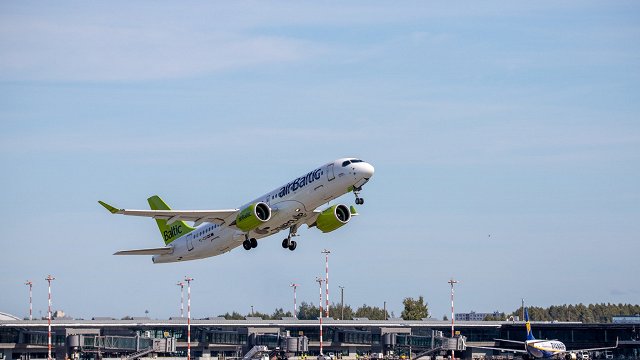Smiltēns was voted out of office by 52 votes to 25 after an unusually intense debating session Wednesday morning, with the vote on appointing a new speaker following. However, a first attempt to confirm a new speaker floundered, with voting inconclusive.
Kūtris has been nominated for the key job by members of the newly-formed three-party coalition of New Unity, ZZS and the Progressives despite the controversy that has surrounded him in the last few days after radio and television interviews in which he voiced his willingness to consult "accused and convicted" individuals on economic matters – seemingly an oblique reference to long-time influential ZZS figure Aivars Lembergs, currently serving a five-year prison sentence for graft.
The controversy has provided an early headache for Prime Minister Evika Siliņa and reignited fears that Lembergs, who is subject to U.S. sanctions, will regain influence in the business of government despite assurances from ZZS and Siliņa alike that it will not be the case.
Following Kūtris' comments, he was given time to apologize by Siliņa, and eventually an apology was forthcoming with Kūtris saying he had not learned to express himself "politically beautifully" – notwithstanding his desire to become Saeima speaker, a position which requires a good deal of political articulacy and also involves deputising for the State President if necessary.
Saeima debates on the removal of Smiltēns and the installation of Kūtris saw opposition members lining up to criticise the appointment, including former Saeima speaker Ināra Mūrniece (National Alliance) who was among those pointing out New Unity had abandoned its values in its desire for more power.
Smiltēns' fellow party member Edgars Tavars (United List) said replacing Smiltēns with Kūtris was a potentially dangerous move and asked: "It's a question of Latvia's independence – are we prepared to risk it?" explaining that the Saeima speaker also sits on the National Security Council and plays a role in forming the country's international image.
Former Prime Minister Māris Kučinskis (United List) also blasted the appointment of Kūtris, despite being a former ZZS member himself.
"Today we are where we are... I invite you to think carefully. The prestige of the Saeima is everything," he said, warning that this might be the thin end of the wedge as far as New Unity's abandonment of principles is concerned.
"What will happen tomorrow, and what values will you abandon?" asked Kučinskis.
ZZS' Viktors Valainis tried to reassure deputies by saying his party would "do everything possible to raise the prestige of the the Saeima" but no other members of the new coalition took the opportunity to defend the appointment of Kūtris, who did not take part in the debate himself.
Rihards Kols (National Alliance) injected an element of satire by suggesting the situation might be resolved by the President issuing pardons to the convicted or accused millionaires whom Kūtris might want to consult.
After the vote on removing Smiltēns from office, an attempt was made to give deputies half an hour to see if they could come up with alternative candidates to Kūtris, but only five minutes were granted, as a result of which Māris Sprindžuks (United List) was put forward.
The vote for Saeima speaker takes place in paper format as opposed to the electronic voting system which the Saeima uses for most of its work, making the whole process a long one. Results of the first vote were inconclusive with neither candidate gaining the support of the majority of the 100 Saeima deputies, who had the option of voting for one candidate and against the other, or of voting against both candidates.
Kūtris received 26 votes for his name and 59 votes against. Sprindžuks received 23 votes for his name and 62 votes against. A significant number of coalition deputies from both the Progressives and New Unity voted against Kūtris – the coalition's own candidate.
It was also notable that while Kūtris voted for himself and against his rival, Sprindžuks did not follow suit, and can at least claim the moral high ground by instead opting to submit a ballot with no preference expressed (and which is therefore inadmissible).
A second vote featuring the same candidates was immediately called but returned similar results with New Unity and Progressives deputies failing to lend their support to their coalition partner. In the second election round, 26 MPs voted for Kūtris, 61 MPs voted against him.
25 MPs from the United List and the National Alliance supported Sprindžuk's candidacy, while 62 were against it. 36 MPs from the New Unity and Progressives factions voted against both candidates.
In the second vote, Sprindžuks did deign to vote for himself and against Kūtris. Subsequently, Sprindžuks withdrew his candidacy, leading to a third round of voting with Kūtris' the only name on the ballot paper. However, it seemed increasingly unlikely that even in a one-horse race Kūtris could cross the line, and so it proved. In the third vote he attracted a meager 18 votes (one of which was himself), with 60 deputies voting against his candidacy.
The result means a new Saeima session will have to be called with new names nominated for the position of speaker and the onus on ZZS to opt for someone more acceptable to their coalition partners.
Whatever the outcome it provides the clearest possible illustration of the maxim usually attributed to British Prime Minister Harold Wilson that "A week is a long time in politics". Less than a week after her government was formed, and with only one meaningful cabinet meeting behind it, Prime Minister Siliņa finds herself in a situation which sees her three party coalition already voting in radically different directions on a matter of national importance.
This is only the third time since the restoration of Latvia's independence that the Speaker of the Saeima has been replaced during a parliamentary term. The members of the Presidium of the Saeima are also expected to be changed later.






























